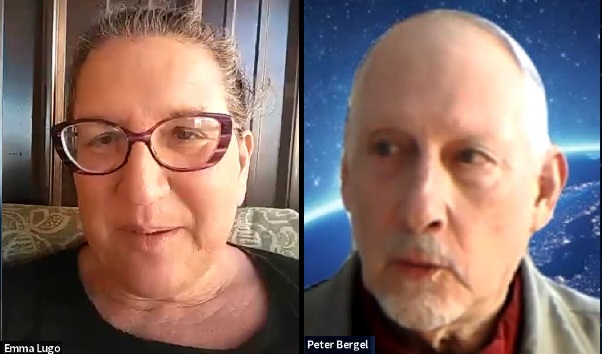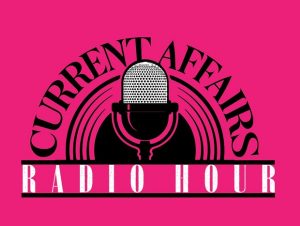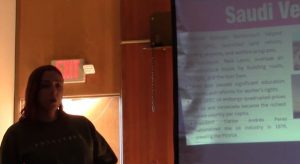Jewish Voice for Peace seeks cease-fire, educates on damage caused by Zionism
11 min read
At the Pacific Green Party convention Feb. 24, opportunities to work for peace. A conversation with Emma Lugo and Peter Bergel:
Emma Lugo (Jewish Voice for Peace): Hi, my name is Emma Lugo, I’m with Jewish Voice for Peace.
Peter Bergel (Oregon PeaceWorks): And I’m Peter Bergel, I’m with Oregon PeaceWorks and I’ve been working on the Oregon Peace Network.
[00:00:17] I was the Executive Director of Oregon PeaceWorks for about a dozen years. That’s OregonPeaceWorks.org. Also the editor of The PeaceWorker newspaper, now an online news magazine, since 1988.
[00:00:31] Currently work on nuclear weapons issues with Nuclear Abolition Now, which is a project of Oregon PeaceWorks and also with several national groups.
[00:00:41] So the purpose of the Network is to build a more peaceful world and a more peaceful world and the work is really becoming much more critical. Wars are raging all over the place. Climate change and nuclear weapons threaten everything that we hold dear.
[00:00:58] Our democracy is in decline. Economic inequality is destroying families and livelihoods. Racial tensions have flared up once again. Environmental threats are all around us and U.S. immigration policy is deeply unfair.
[00:01:13] So there’s lots to work on in the broader area that we consider to be under the heading of peace.
[00:01:21] My feeling is that if we continue to work in silos, which we have done for most of my organizing career, it seems likely that no cause is going to gather enough support to force change in the face of the corporate interests that oppose us.
[00:01:37] And so, it really is necessary that we come together in some form. And so the Oregon Peace Network is an effort to do that, to strengthen and broaden the work for peace in Oregon.
[00:01:49] And as I say, we define peace quite broadly, including many kinds of efforts to build a better and more secure, more democratic, and more just society—locally, nationally and globally.
[00:02:01] We want to provide a space where groups can learn about each other’s work and seek opportunities to cooperate more effectively and support each other’s efforts.
[00:02:12] We are not trying to form a new group. We’re trying to form a network of groups. So kind of the beginning of a movement of movements.
[00:02:20] We want to do three things specifically at the outset here: We want to jointly create a strategic peace plan for the state; we want to share diverse ideas for working independently; and together, and we want to support each other’s projects.
[00:02:39] So the history is that the Oregon Peace Network idea (which I’ll be calling OPN), grew from combining three initial initiatives:
[00:02:52] (1) A group in Portland called itself the Oregon Peace Network and began to reach out to other peace-oriented groups in Oregon.
[00:02:59] (2) A group in Corvallis, which had successfully gotten City Council there in Corvallis to divest from military investments, began to reach out to other groups to encourage the spread of their approach.
[00:03:14] (3) And Oregon PeaceWorks, which has become much less active since closing its doors and laying off its staff about 10 years ago, became aware of these two other efforts and proposed that the new network slowly evolve into what Oregon PeaceWorks had once been, which was a statewide peace organization.
[00:03:34] So after meetings sporadically for about a year or so now, a core of representatives from different groups has somewhat solidified an operating structure. And we are now seeking input from groups and individuals regarding what kind of network they want to see develop, if any.
[00:03:53] So the groups that have been participating so far have been: Oregon PeaceWorks, Jewish Voice for Peace, Planet versus Pentagon, Oregon Green Party, Veterans for Peace, Progressive Democrats of America, and the Mid-Valley Solidarity Coalition.
[00:04:10] We’d like to include other groups, such as: Divest Oregon, Sunrise Corvallis, Sunrise Movement, Democratic Socialists of America, 350 and all its chapters, the Ashland Peace House, Rural Organizing Project, NAACP, and Coast Range Association, to name a few of many others that could be part of this.
[00:04:33] So the way that we would like to invite you to participate is to share your views on what kind of a peace network you want to see develop in Oregon and to work with us either as an individual or as a group representative.
[00:04:48] And we’d like to have you fill this out—a Google Forms questionnaire—by March 1, if you’re interested. And it seeks your input and an email address for getting in touch with you in the future.
[00:05:02] And it will tell us a great deal more about what the people who are potential members and group members of the Oregon Peace Network actually want to see the Oregon Peace Network become.
[00:05:15] Emma Lugo: My name is Emma Lugo. I am a former two-time candidate for U.S. Senate as a Green Party candidate. I ran for U.S. Senate once in Tennessee, and then I ran in 2014 against (Sen.) Jeff Merkley as a Green Party candidate.
[00:05:35] And in 2014, I ran because that was the last time that Israel mass-murdered Palestinians. It was during the 2014 war on Gaza, in which 2,600 Gazans were murdered by Israel.
And at that time, Jeff Merkley was supporting Israel, and I decided to, you know, kind of let Jeff Merkley know that there were a lot of people who didn’t support what Israel was doing, and maybe a really clear way to make that clear to him was by running against him. You know, even though as a minor party candidate you really don’t have any chance of winning, but it’s still a great way to really make an important statement.
[00:06:19] Anyway, so I am working with Jewish Voice for Peace. I’ve been involved often with Jewish Voice for Peace for about 20 years. And I am happy to report that this time around, Jeff Merkley was one of three U.S. senators who voted for a cease-fire, which is just amazing that we made that much progress. He was one of only three senators in the entire country. So that just shows you how far we have to go.
[00:06:47] Anyways, let’s just talk a little bit about this data about what’s been going on since Oct. 7, which was a horrible day. I was leading Torah study that day at Congregation Shir Tikvah, where I’m the president, and it was Shemini Atzeret, which is the eighth day of, it’s the very end of the Jewish high holiday season.
[00:07:09] And on that day, 1,200 Jewish citizens, Jewish and American, and people from all around the world were mass-murdered by people who crossed the fence from Gaza into the south of Israel, mostly where the kibbutzim are.
[00:07:29] And they killed women and children. They killed old people and young people. They killed about 250 people at a rock concert. And it was the worst day of mass murder in Jewish history since the Holocaust, although it’s just the latest in a long, long line of pogroms and mass murders of Jews that have happened ever since antiquity. So that was horrible.
[00:07:58] But then what Israel did in response to that was, since Oct. 7, Israel has displaced two million Gazans—99% of the population of Gaza—has been run out of their homes. They’ve destroyed over 50% of Gaza’s entire housing stock. They cut off their water, they cut off their electricity. They’ve mass-murdered over 27,000 people, including over 9,000 children, 8,000 women, and they’ve injured 64,000 – 65,000 people so far.
[00:08:36] Right now, Israel’s about to—they’re in the middle of doing the cruelest thing I can imagine, one of the cruelest things I’ve seen in modern history. They’ve taken all of those refugees, they’ve put them down in Rafah, and now they’ve said, ‘You’ve got to get out of here, and there’s no place for you to go.’ And that’s the whole point of what Israel’s doing, is that it’s trying to make life just completely unbearable, as it has for the people of Gaza for the last almost 20 years.
[00:09:06] And there’s a group of people in the United States. They belong to Jewish Voice for Peace. We’re a national organization of Jews and allies who are working together to end Zionism. We’re specifically anti-Zionist, you know: Our eyes are on Israel. We want to end this colonialist-militarist state that has just been the cause of so much suffering and anguish for Palestinians.
[00:09:41] There’s been over 750,000 Palestinians displaced since 1948. Israel has taken, you know, almost 75% of a country that it did not have a legal right to. People may say, ‘Well, Israel should have a legal right to be in Israel, because we were all kicked out 2,000 years ago.’ But in the 2,000 years since that happened, there’s been 2,000 years of other people living there. And you can’t just go in and tell people who have been living somewhere for 2,000 years that it’s not their home.
[00:10:19] So anyways, we are involved here in Portland. We have about 120 active people on our Slack. We coordinate with national Jewish Voice for Peace, which is based in Berkeley, and we work with chapters all around the country to do coordinated actions that are designed to raise the profile of the voices of anti-Zionist Jews and to call out the direct harm that U.S. policy is doing and U.S. support of Israel is doing for the people of Palestine.
[00:10:55] We have many ways you can get involved. You don’t have to be Jewish. You can be an ally and you can be involved. We have weekly meetings as part of our Jewish Voice for Peace Steering Committee, and we have about 10 different working groups that you can plug into. We have a working group dedicated to communication. We have one dedicated to protest. We have one dedicated to political research. One dedicated to political outreach. We have one dedicated to community education. We have an IT group. It’s really amazing.
[00:11:32] I mean, I’ve seen how this group of mostly young folks, they’re almost everybody in the group right now is like in their 20s. And they pretty much took it over. Before it was mostly folks in their 60s and we met like once a month and every now and then we did something. But as soon as Oct. 7 happened, that group of older folks pretty much got absorbed into this whole new thing and right now we have about 400 people who are actively engaged in the group on some level..
And about 124 of them, right now, we’re right in the middle of working with the Multnomah County commission. After a very successful campaign effort last month with the Multnomah County Commission, it looks like we’re going to be getting a cease-fire statement from the Multnomah County Commission, which is just amazing. We’re so excited about that.
[00:12:28] Of course, we just had Ron Wyden flip. Really, I mean, that was just amazing to get Ron Wyden to support a cease-fire. So all of our effort right now is for calling for a ceasefire. Like that’s the very first thing that needs to happen. It’s the most minimal thing that needs to happen.
[00:12:47] I mean, what needs to happen is Israel needs to be tried before the ICRC, which it has been. It needs to be convicted of genocide. It needs to pay reparations to the people of Palestine. It needs to rebuild Gaza. And it needs to work toward a peace process. That’s the ultimate goal.
[00:13:07] But right now, what we need more than anything is: We need a peace process. And that’s what all of our work is leading to.
[00:13:14] John Q (KEPW 97.3 / Whole Community News): We do have a few questions now that have come up in the Q&A area. And one is about: How does the (Oregon Peace) Network decide what particular actions to get involved with? Is that up to each individual group, or does the (Oregon Peace) Network make a decision and then all participate together? (That’s for you Peter.)
[00:13:34] Peter Bergel: Up ‘til now it’s been kind of a sharing thing, so that people get together and they have been telling each other what they’re doing and inviting other people to participate. And the hope is that members will take the invitation back to their local groups and the local group will then decide whether or not to get involved.
[00:13:56] John Q: And here’s one for both of you: Are there any joint peace groups with both Palestinians and Jewish members?
[00:14:04] Emma Lugo: Oh, yes, just in Portland, there’s several. But in Portland, two of the most active right now, there’s one group called the Jewish Palestinian Alliance of Oregon, and they meet every Monday.
[00:14:15] And then there’s another group called the Oregon to Palestine Coalition. And that’s a group of younger folks, the same kind of folks who are kind of really in charge right now at JVP. And they’re super active.
[00:14:29] Students United for Palestinian Human Rights and Americans United for Palestinian Human Rights are two other organizations that are largely composed of Jewish and Palestinian or Palestinian and Jewish communities organizing together.
[00:14:45] Peter Bergel: What about Zaytuna? Does that still exist?
[00:14:48] Emma Lugo: Yes, I don’t know much about them, but I have heard of them.
[00:14:52] John Q: Next question is for Emma: Does the JVP meet with the presidential candidates and do they intend to endorse a candidate or candidates who call for a cease-fire?
[00:15:04] Emma Lugo: We do have a 501(c)(4). You know, I’m sure they would be happy to meet with Jill Stein, if Jill would like to speak with JVP. I think that’s something that would have to happen on the national level, but I would definitely encourage Jill to get in touch with JVP, especially since Jill has a little bit of heritage herself.
[00:15:26] It would be great to give her our endorsement, so if you’d like, get in touch with me and I’ll be happy to put you in touch with the political arm of our coalition.
[00:15:37] John Q: Thank you very much. Anything to wrap up and any upcoming events that people may be interested in attending?
[00:15:46] Emma Lugo: Jewish Voice for Peace has several things coming up in the Portland area. We’re going to be at the Multnomah County Commission again. We’re going to be there hopefully to watch the Multnomah County Commission pass some cease-fire resolution. So we’ll be standing outside before the meeting and then we’ll be in the atrium after the meeting.
[00:16:06] Also March 1, there’s going to be a marching rally organized by a group allied with JVP in Portland.
[00:16:14] And March 18, we have two events. We’re going to be doing a screening of the film Israelism. That’s going to be at the Clinton Theater. So if you’d like to come out for that, that’s going to be a movie screening of the film Israelism, and then on that same night, we’re having a panel discussion over at the Eastside Jewish Commons with two Palestinians and two Jews
[00:16:38] John Q: Multnomah County will consider the cease-fire resolution this Thursday, Feb. 29.






